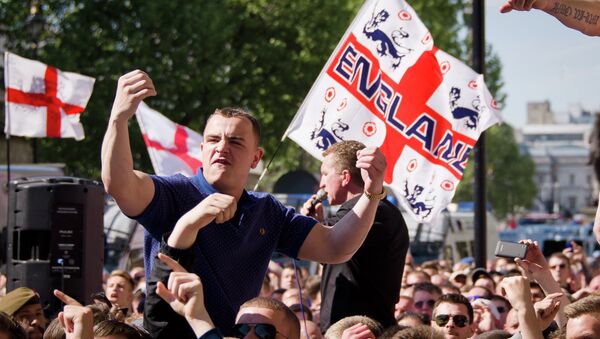The report, prepared by the charity HOPE Not Hate, states: “The British far right ends 2014 in its worst state for almost 20 years.” Nick Lowles, editor of a magazine published by Hope Not Hate says that in the UK, at least for now, the far right is ‘electorally … politically finished’.
@hopenothate find that far-right organisations still active online but less so on the street http://t.co/868P8NUfl8 pic.twitter.com/gESxSUYjeu
— Intelex political (@IntelexIntel) January 14, 2015
Lowles argues that “there has been a disturbing trend among some commentators to present the far right as some ever-rising force, both here [UK] and across Europe. As our 2014 State of Hate report shows, this is not the case.”
The statement may sound comforting but not entirely convincing. To begin with, this is not a view expressed by ‘some commentators’. It’s statistics, pure and simple that tell us that far right sentiment is indeed growing all over Europe. The list would have to include most of the countries of the EU and those outside the community.
Following the terrible massacres in Paris, press coverage has concentrated on campaigns and marches in support of Charlie Hebdo and freedom of the press, but in the meantime, PEGIDA ‘anti-Islamisation’ marches in Germany have been seeing steadily growing numbers — chances are, attendance will increase further and will likely spread to other countries.
Change of Tack?
The British National Party (BNP), the English Defence League (EDL), National Action, Britain First, the British Movement and similar organisations — a couple dozen of them — are now increasingly marginalised and sound quite obscure. They have indeed seen their fortunes tumble and memberships dwindle.
That would seem to defy expectations of a rise in their numbers, what with the rise of Islamic extremism and the Rotherham scandal (apparently one of several) when vulnerable white girls were on an industrial scale groomed for sex by gangs of predominantly Muslim men.
But that doesn’t necessarily mean that the underlying ideology has evaporated and its proponents have disappeared. According to Nick Lowles himself, most voters of the BNP now feel “quite at home in the UKIP stable”. And UKIP has of course, seen spectacular growth in support.
The far right sentiment has certainly been relegated to the ranks of the unmentionable in Britain: few people will openly declare their allegiance to the BNP or EDL. And even though discussing one’s electoral preferences in Britain is generally frowned upon, voting UKIP now seems much more socially acceptable.
Hope Not Hate points out — quite rightly — that UKIP has attracted many former BNP voters. It is another question, though, whether in the longer term UKIP will keep those voters happy by giving them enough of a voice and coming up with coherent policies on issues that originally attracted those voters to patently far right groups.
Perceptions
A recent chat show on Fox News ruffled some feathers in the UK, when Steve Emerson, a self-styled (American) expert on terrorism said that Birmingham was a ‘totally Muslim city’ where non-Muslims ‘just won’t go’.
The remark triggered a mocking hashtag on Twitter #foxnewsfacts and a general wave of merry sniping, while the British PM David Cameron described Emerson as ‘clearly an idiot’. But the fact remains that some Brits share those views.
On that same Fox News channel and in his other appearances UKIP leader Nigel Farage has in fact been saying much the same thing about Europe and Britain:
“…You see the growth of ghettos where the police and all the normal agents of the law have withdrawn and that is where Sharia law has come in and you know it got so bad in Britain that our last archbishop of Canterbury, the leader of our church, actually said we should accept Sharia law.”
The fact that UKIP has now been granted the status of one of the ‘main’ political parties gives it more than a share of press coverage; it also recognises UKIP as part of the establishment. Which may actually make UKIP policies and statements more acceptable nationally or compel UKIP to adapt its loose canon rhetoric and policies to Westminster ways.
UKIP has been subjected to lots of ridicule over a number of embarrassing gaffes by some of its more overt right-wingers. But UKIP is certainly not the only party to include individuals of pretty extreme views. For one, Alan Mellins, a Conservative Councillor in Windsor and Maidenhead had to resign late last year after he caused a furore by calling for travellers to be ‘executed’.
Narrow Definition
The British think-tank Demos that has for years been monitoring right-wing parties in Europe points out that two-thirds of those affiliated with them are young people under the age of 30. If that’s the evidence in many countries on the continent, there is no reason to suppose that it may not happen in the UK.
The under-30s age group in the UK is least interested in politics and least likely to vote. Traditional liberal values in British society are of course strong but it is not inconceivable that the apolitical group might be vulnerable to all sorts of radical influences. Disillusionment with mainstream politics is well documented and probably not limited to Russell Brand’s kind of ‘revolution'.
One other point to make is that the term ‘far right’ in its classic definition does not of course cover what has come to be known as ‘Islamic extremism’.
When this Islamic extremism is home-grown and festering in British Muslim communities, perhaps it would make sense to include it in the definition — for the simple reason that the core ‘values’ and instincts of both these opposing groups are essentially the same: intolerance, xenophobia, racism.
So if the term is applied inclusively, ‘far right’ begins to look much more like a present danger while the decline of the far right does not look so convincing anymore. Western ‘liberal values’ could be invoked as a point of fundamental difference between them. But then again, the far-right of any ideological hue have never been known to cherish those values.


